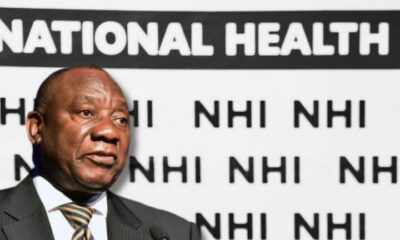News
Medical Aid Relief, For Now: Treasury Hits Pause on Scrapping Tax Credits as Households Struggle

South Africans breathe easier after weeks of uncertainty, but the debate over how to fund the NHI is far from over.
For a brief moment this week, South Africa’s overburdened medical aid members could finally exhale. After several tense weeks of rumours and rising panic, Finance Minister Enoch Godongwana made it clear: government has not decided to scrap medical aid tax creditsat least not yet.
His clarification came just before the Medium-Term Budget Policy Statement (MTBPS), cutting through the noise that had been spreading across social media, medical forums, and dinner-table conversations.
And the noise was loud.
Where the panic started
The anxiety began when Deputy Director-General of Health Nicholas Crisp suggested that Treasury and the Department of Health were exploring ways to phase out the medical tax rebatea move long linked to financing the National Health Insurance (NHI).
In a country where medical aid often feels like the last safety net for the middle class, this landed like a heavy punch.
Industry stakeholders immediately sought clarity. The Board of Healthcare Funders (BHF), which represents medical schemes across South Africa, sent an urgent letter to Treasury in October. They wanted timelines. They wanted transparency. They wanted reassurance.
They received noneuntil now.
Treasury steps in with a cooler head
Godongwana, speaking plainly, said he had issued no directive to scrap the credits. He even went further, warning that such a move would hit the heart of the tax base: the country’s already squeezed middle class.
“The people who are currently receiving medical tax credits are the bulk of those contributing to personal income tax,” he cautioned. “Removing the tax credit will effectively be an attack on the middle class.”
His message, between the lines:
You can’t break the engine that keeps the revenue machine running.
A Treasury official confirmed that conversations with the Department of Health are happeningbut they’re exploratory, not final. No model, no mechanism, no approved funding plan for the NHI has yet been signed off.
But a troubling presentation raised eyebrows
The BHF’s concern wasn’t invented. A recent Health Department presentation to Parliament laid out a boldand controversialproposal: wipe out medical tax credits for all income groups by 2029, even before the NHI is fully operational.
That landed badly.
Especially after BHF-commissioned research estimated that removing these credits could push 430,000 to 690,000 lower-income members out of private medical aid entirely. That means fewer dependents covered, more people relying on already strained public hospitals, and greater pressure on a health system still battling equipment shortages, staff vacancies, and long waiting lists.
Healthcare analysts have warned for years that the country’s dual health systemprivate and publicbarely holds as it is. Removing tax credits without a fully ready NHI would tighten that tension.
Meanwhile, households are already cutting corners
If there’s one thing the latest consumer data makes clear, it’s that South Africans are living in survival mode.
A 2025 InfoQuest and Decapod survey shows the depth of financial strain:
-
41% have already reduced medical aid, insurance, or savings
-
90% are hunting for bargains
-
85% have cut back on luxuries
-
83% have reduced eating out and socialising
-
Two-thirds cancelled or slashed streaming services
-
62% switched to cheaper grocery stores
-
56% gave up hobbies
-
51% are carpooling or using public transport
-
Nearly half ditched gym memberships
-
4 in 10 moved to smaller homes
-
Over a third paused education
-
29% are selling or pawning items
-
27% borrowed money from family or friends
Scrapping medical tax credits in this climate? It would be like removing lifejackets during a storm.
Public reaction: relief mixed with scepticism
On X (formerly Twitter), reactions ranged from relieved to cynical:
“Good news, but I’m not convinced. They’ll revisit this after elections,” one user posted.
“Middle class always paysjust waiting for the next announcement,” said another.
On Facebook community groups, especially those focused on health and finance advice, members expressed cautious optimism. Many said they feared losing coverage, especially with rising co-payments, hospital plan premiums, and the cost of chronic medication.
One user summed up the mood perfectly:
“This buys us time, but it’s not a victory yet.”
What this means going forward
For now, the medical aid tax credit remains intact.
But uncertainty lingers.
The NHI is lawbut not yet functional. Its funding model remains one of the biggest unanswered questions in South African policy. Treasury wants to protect the tax base; the Health Department wants to push ahead with universal healthcare. Those goals don’t easily align.
And South Africans?
They’re caught in the middle, juggling shrinking budgets while bracing for the next policy shift.
For today, at least, medical aid members have some relief.
Tomorrow may be a different story.
{Source: BusinessTech}
Follow Joburg ETC on Facebook, Twitter , TikTok and Instagram
For more News in Johannesburg, visit joburgetc.com



























